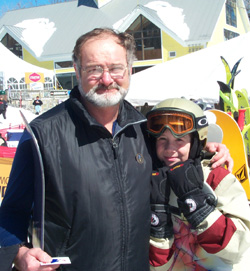Joseph V. Henderson, MD, MA, MS

Title(s)
Emeritus Professor of Community and Family Medicine
Department(s)
Community and Family Medicine
Education
SUNY - Buffalo School of Medicine, MD 1975
MA (Physiology) 1971
Yale University, MPhil (Epidemiology) 1993
Programs
Interactive Media Lab
Websites
http:
Contact Information
PO BOX 372
Grantham NH 03753
Phone: 603-491-8128
Email: Joseph.Henderson@Dartmouth.edu
Professional Interests
Most of my career has focused on the use of computer, media, and communication technologies for the education of health professionals and patients, emphasizing complex decision-making. By the last, I mean creating learning environments that balance the learning of more easily codified knowledge (e.g., scientific facts, theories, and protocols) with learning that which is less easily codified (e.g., risk-benefit assessment and decision-making), to work effectively in what Donald Schön called the “swamp,” the non-deterministic realms of real-world practice. With Schön’s Reflective Practicum in mind, I designed the technology-based “Virtual Practicum,” incorporating simulations, lectures, and exercises, along with mentoring by actual (though virtually-represented) expert practitioners. To date our group has developed eight large-scale e-Learning programs using this model, all dealing with complex topics ranging from management of cancer-related pain to medical/forensic care of sexual assault patients (see Section D, below). In addition to serving as PI for these projects, I was also the designer, writer, director, and producer.
Another major theme in my career has been the melding of technology development with content development. With all of our projects our team strives to create good, usable (even enjoyable) computer programs, but our first priority is that what we present is accurate, current, and useful. To this end we have been able to recruit teachers and practitioners who are leading experts in the topics under consideration, to act as advisors and, in some cases, to be mentors appearing in our programs. We have developed a very thorough process of content creation and iterative review. For example, the program being considered in this proposal, the Virtual Terrorism Response Academy, involved numerous meetings with advisors, in groups and individually; extensive review of pertinent research, standards and manuals; several sessions of prototype review; and alpha and beta testing by more than 200 actual practitioners, many of them themselves hazmat trainers. In a final step, the program was reviewed and approved by a panel appointed by the Department of Homeland Security.
I am now retired and Professor Emeritus at Dartmouth. I and my team have formed World 2 Systems to carry on our work, having licensed all of our programs from Dartmouth. I’m excited about the possibility of making our programs more accessible, and thus used more widely (hopefully, much more widely). But I’m also excited about exploring the new technologies that we need to move our program from DVD-ROM to the Web. It can’t be done with the Web development tools currently in common use. New tools, HTML5, CCS3, WebGL and others, are all exciting new developments that make this migration possible. Our team may also have the opportunity to develop additional tools. My great hope is that educators seeing our program running well with these new technologies will derive some benefit from the example.
Grant Information
Grants from the Centers for Diease Control and Prevention, Department of Homeland Security, and US Department of Justice to develop Advanced Training Technology methods and training courses for health professionals and emergency responders.
Selected Publications |
|
Henderson JV The virtual terrorism response academy: training for high-risk, low-frequency threats. Stud Health Technol Inform. 2005;111:185-90. (view details in PubMed) Henderson JV A Next-Generation Distance Learning System for Public Health. Am. J. Prev. Med., 17 (2), 159-160, 1999. (view details in PubMed) Henderson JV Comprehensive, technology-based clinical education: the. Int J Psychiatry Med. 1998;28(1):41-79 (view details in PubMed) Anderson PB1, Bennett RS, Henderson JV, Hirschfeld JA, Nichols MG Interactive technology. EMS training goes online in Idaho. JEMS. 1990 Oct;15(10):34-8 (view details in PubMed) Henderson JV Virtual Realities as instructional technology. J. Interactive Instruction Development, Summer 1991, pp. 4:24-430 Henderson JV Meditation on the New Media and professional education. In Health and the New Media, Harris L (Ed.), Erlbaum: Mahwah, NJ, 1996, pp. 185-205 Henderson, J, Noell, J, Reeves, T, Robinson, T, and Strecher, V Developers and evaluation of interactive health communication applications. The Science Panel on Interactive Communications and Health. Am. J. Prev. Med., 16(1):30-34, 1999 (view details in PubMed) Henderson JV, Pruett RK, Galper AR, Copes WS Interactive videodisc to teach combat trauma life support. J Med Syst. 1986 Jun;10(3):271-6. (view details in PubMed) Eng TR1, Gustafson DH, Henderson J, Jimison H, Patrick K Introduction to evaluation of interactive health communication applications. Science Panel on Interactive Communication and Health. Am J Prev Med. 1999 Jan;16(1):10-5 (view details in PubMed) Henderson J The importance of operational definitions in design of a combat casualty information system. J Med Syst. 1983 Oct;7(5):413-26 (view details in PubMed) |
|